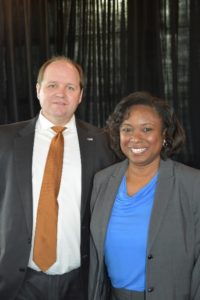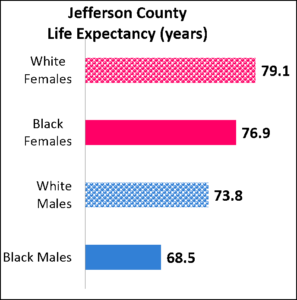Where you live, learn, work and play has a lot to do with how healthy you are and even how long you will live. “Place Matters” was a message heard loud and clear this month at the Jefferson County Health Action Partnership Annual Summit.
 The event is a yearly celebration of local health efforts and the people who are committed to improving the health of communities across Central Alabama. The 2018 summit highlighted the release of the Jefferson County Community Health Equity Report and the need for continued awareness and efforts to decrease health disparities.
The event is a yearly celebration of local health efforts and the people who are committed to improving the health of communities across Central Alabama. The 2018 summit highlighted the release of the Jefferson County Community Health Equity Report and the need for continued awareness and efforts to decrease health disparities.
Health disparities are defined as preventable differences in the presence of disease, health outcomes and/or access to healthcare among various population groups. Health disparities are well documented among racial and ethnic minorities, as well as rural and socioeconomically disadvantaged populations. The newly released map-based report looks at local health outcomes – focusing on community characteristics such as education, poverty, neighborhood segregation and healthy food access – all of which may impact health outcomes and life expectancy. The report also explores the current efforts to achieve health equity in Central Alabama.

Dr. Monica Baskin, Professor and Vice Chair for Culture and Diversity and Associate Director for Community Outreach and Engagement within the UAB School of Medicine, delivered this year’s keynote address highlighting the findings within the Health Equity Report. The current report is intended to inform the public, decision makers and funders of the greatest health-related needs within our community, and highlight ongoing collaborative efforts to improve health and well being.
While there have been improvements in health outcomes and health behaviors in Jefferson County during the last five years, there are persistent disparities among residents that highlight the need for continued efforts.
Highlights:
- Life expectancy for Jefferson County in 2015 was 75.0 years compared to 75.5 years for Alabama and 78.8 years for the U.S. Life expectancy was 79.1 for white females, 76.9 for black females, 73.8 for white males and 68.5 for black males. Life expectancy varies by as much as 28.9 years among census tracts.
- The infant mortality rate for Jefferson County in 2015 was 10.5 deaths per 1,000 live births – almost double the national rate of 5.9 deaths per 1,000 live births and substantially higher than the Alabama rate of 8.3 deaths per 1,000 live births. The infant mortality rate for black mothers was 2.3 times higher than white mothers.
- Overall, this study found significant variation in racial residential concentration, disability status, poverty, life expectancy, infant mortality and healthy food access among census tracts in the Over-the-Mountain and Trussville areas compared to areas near the Interstate 20/59 corridor.
In an effort to address the comprehensive nature of community health, the work of the Jefferson County Health Action Partnership is currently focused on improving mental health, optimizing healthcare access, advancing health equity, promoting healthy lifestyles and improving the built environment, transportation and safety. The Community Foundation of Greater Birmingham, Jefferson County Department of Health, Jefferson County Collaborative for Health Equity, Community Food Bank of Central Alabama, and United Way of Central Alabama are currently providing leadership to the nearly 80 community organizations working in these areas.
All of these efforts are designed to support the work of the Bold Goals Coalition’s collaborative approach to ensuring all Central Alabama counties will be ranked among the top 10 counties for health outcomes in Alabama by 2025.
To learn more about the Community Health Equity Report or the Health Action Partnership, please contact Kadie Peters, Vice President of Community Impact for Health at United Way of Central Alabama, at kpeters@uwca.org.

